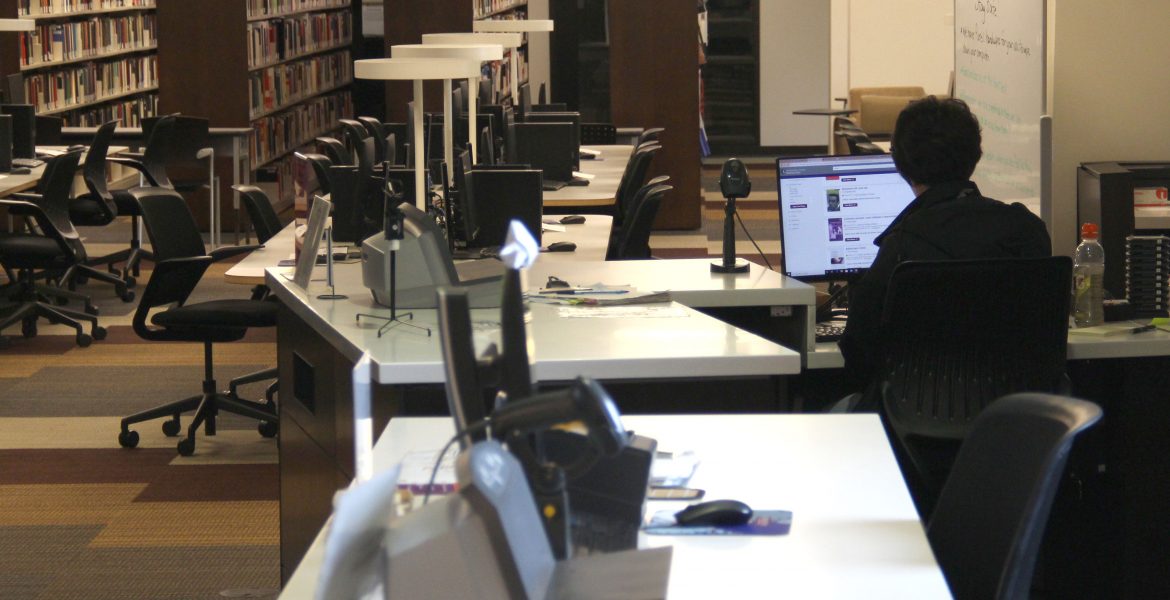Departments and offices at Texas A&M University-San Antonio are offering students services remotely, adhering to San Antonio’s “Stay Home, Work Safe” order.
Mays Center offers career resources
By Sandy Cordell
Although A&M-San Antonio students are unable to visit campus because of the coronavirus, they still have the opportunity to meet with a career adviser in the Mays Center.
“We still want our students and alumni to know the Mays Center is still here to support every Jaguar’s career journey,” Clarissa Tejeda, assistant director of career services, said.
The Mays Center has evolved their appointment structures to include communicating via email, voice, live or video chat.
“One of the best parts of working in higher education is having the opportunity to connect with students and seeing them evolve into dynamic professionals,” Tejeda said.
The Mays Center has begun building a library of video content for the center’s YouTube channel. Topics include graduate school, personal branding and resume writing. The center is also looking to engage employers to feature them in a virtual setting. To watch videos, visit https://www.youtube.com/channel/UCgthP2VmOld3FNjiA_dpTAw/videos
“While we recognize we cannot offer that connection in person, our team has really rose to the occasion with developing an expansion of our service offerings within virtual platforms,” Tejeda said. “This moment has really sparked a goal for us to continue to expand on virtual offerings even in the future to assist our distance learners even more effectively.”
To schedule an appointment, visit https://www.tamusa.edu/mays.
University caters to students with disabilities remotely
By Brigid Cooley
As the university moves to online classes, the office of Disability Support Services continues to provide resources to students with disabilities.
“We are able to provide accommodations and services in a remote format as long as the students are also remote,” Sarah Ramseur, director of DSS, said. “So, it really looks much the same as it would from a process standpoint regarding what needs to happen in order to register or to schedule something. It’s just the formatting or the end product that changes a little bit.”
DSS is offering students resources spanning from note-taking help to exam accommodations. Students must self-identify as having a disability to be eligible for services.
“We’re providing services via phone, email, Webex, any type of Zoom meeting, whatever the student needs to stay connected,” Ramseur said. “Then from the accommodations perspective, the adjustments that needed to be made were making sure that our students had the necessary equipment and connections to be able to do the classes and then also to have the accommodation.”
Ramseur said students who were not previously signed up for accommodations are continuing to reach out during this time.
“It (remote learning) hasn’t stopped the process of individuals newly self-identifying to our office and requesting for accommodations,” Ramseur said.
Students can contact the office by emailing dss@tamusa.edu or calling 210-784-1335. The office can also be followed on social media @tamusadss.
University Library transitions to online
By Monroe Olivares
As the COVID-19 pandemic continues to affect the world, departments and programs at A&M-San Antonio are adjusting to address student needs.
Tim Gritten, the executive director of the University Library, described how the library is handling all of the changes.
“Fortunately for us, the library was prepared to move online,” Gritten said. “Moving to a fully remote location caused a few hiccups, but many of our services have been online for years.”
Because much of San Antonio is quarantined, the library has faced its share of challenges.
“The biggest challenge for us was the interlibrary loan,” Gritten said. “As so many libraries quickly closed around the country, it became harder to find articles and book chapters that students and faculty want to borrow.
To combat this issue, A&M-San Antonio joined a service called RapidILL, a resource sharing system that was designed by the Interlibrary Loan staff at Colorado State University Libraries. RapidILL was developed to provide fast, cost-effective article requests and delivery through Interlibrary Loan.
“The library has always offered spaces of respite from the outside chaos — quiet spaces away from the noise of a full house, residence hall or classroom,” Gritten said. “We have also offered spaces for people to meet, to collaborate, to bounce ideas off their friends, and to learn about new and diverse ideas. I am disappointed that we can’t provide those spaces now. I am ready to return to our physical space, and to help people face-to-face.”
For more information about the library’s online services, email library@tamusa.edu or visit https://jagsync.tamusa.edu/organization/university-library.






